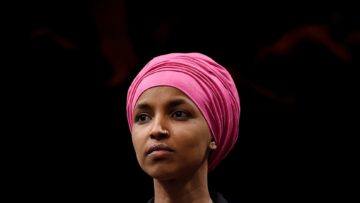Elizabeth Bruenig in The Atlantic:
 By the time Republicans and centrist Democrats had united late last week to scold Representative Ilhan Omar for a tweet—one of the few pastimes that still draw the two parties together, and something those selfsame chiders would doubtlessly decry, under different circumstances, as cancel culture or censorship—it no longer mattered what, exactly, Omar had said. They had already managed to make a news cycle out of it: mission accomplished. Now, following Democratic outrage and Republican calls for a floor vote to strip Omar of her committee assignments, let me record the following for posterity: Omar demonstrably did not say what she’s been accused of having said; what she did say was true; and every politico using this opportunity to take a swing at her likely knows those two things—they just think you don’t.
By the time Republicans and centrist Democrats had united late last week to scold Representative Ilhan Omar for a tweet—one of the few pastimes that still draw the two parties together, and something those selfsame chiders would doubtlessly decry, under different circumstances, as cancel culture or censorship—it no longer mattered what, exactly, Omar had said. They had already managed to make a news cycle out of it: mission accomplished. Now, following Democratic outrage and Republican calls for a floor vote to strip Omar of her committee assignments, let me record the following for posterity: Omar demonstrably did not say what she’s been accused of having said; what she did say was true; and every politico using this opportunity to take a swing at her likely knows those two things—they just think you don’t.
What did Omar say? Context is key. In 2020, the Trump administration imposed sanctions on International Criminal Court prosecutors who moved to investigate potential U.S. war crimes in Afghanistan as well as potential Israeli crimes in the West Bank, East Jerusalem, and Gaza, arguing that because the U.S. and Israel aren’t members of the ICC, the court has no right to adjudicate such matters. (The ICC recognizes the State of Palestine as a party to its governing statute, a decision that the U.S. insists the ICC lacks the power to make.) Omar vocally opposed the sanctions—as did the European Union, the president of the ICC’s Assembly of States Parties, Senator Patrick Leahy, and, presumably, anyone skeptical of America’s willingness to look into its own savagery abroad.
During a June 7 budget hearing, Omar asked Secretary of State Antony Blinken a series of questions based on the ICC incident. First, Omar praised Blinken for lifting the Trump-era sanctions. Then she pointed out that he nevertheless still opposed an ICC investigation into war crimes in Afghanistan and Palestine—including, in the first case, offenses allegedly perpetrated by the U.S., the Afghan national government, and the Taliban; and, in the second, Israeli security forces and Hamas. Omar asked, “Where do we think victims are supposed to go for justice? And what justice mechanisms do you support?”
To which Blinken replied, more or less, that the U.S. and Israel are competent to adjudicate all of the above. This raised the obvious question Then why haven’t they?, but Omar’s time was up, and she politely yielded to the next representative. Later that day, Omar’s official Twitter account shared a video and tweeted a paraphrase of the exchange. The tweet read, in its entirety: “We must have the same level of accountability and justice for all victims of crimes against humanity. We have seen unthinkable atrocities committed by the U.S., Hamas, Israel, Afghanistan, and the Taliban. I asked @SecBlinken where people are supposed to go for justice.”
More here.
